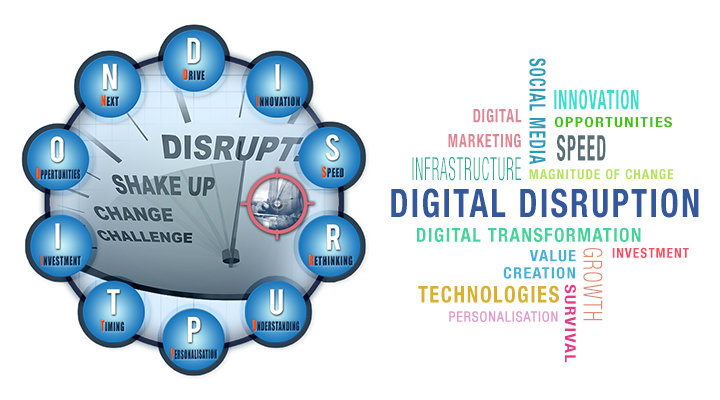
Having the potential to turn the sails in favour of neophytes and bring down incumbents, [bctt tweet=”Digital Disruption is reshaping markets with the speed and force that has no match in history!”]
Survivors are those businesses that are pro-actively adopting digital, but in order to thrive, they must also innovate new business models to keep pace with the digital age!

What does Digital DISRUPTION mean for your business? If it’s the destiny of every business what can we do to prepare for it? Let’s dive in and find out!
Drive for digital has already happened!
 According to a forecast by Accenture, in just 5 years, [bctt tweet=”Australia’s digital economy is going to experience a 26.1% growth from 2015 to 2020.”]
According to a forecast by Accenture, in just 5 years, [bctt tweet=”Australia’s digital economy is going to experience a 26.1% growth from 2015 to 2020.”]
Business around the globe are spending $174 billion on cloud technologies alone. Many organisations now have chief digital officers or have developed separate units that are responsible for driving digital strategy.
While the stats look promising, many business are still struggling with their organisational structures to facilitate the change towards digital transformation and to face the digital disruption challenges head on!
Innovation is transforming every business!
 The phenomenon of digital disruption is not a new one! Nonetheless the opportunities and risks it presents change over time and [bctt tweet=”those who make the first move, history remembers them as innovators! “]
The phenomenon of digital disruption is not a new one! Nonetheless the opportunities and risks it presents change over time and [bctt tweet=”those who make the first move, history remembers them as innovators! “]
Ever wondered how iPod replaced CDs, how Amazon defeated Barns and Nobles, why didn’t Marriot think of AirBnb, why cab drivers couldn’t come up with a brilliant idea that Uber did and how Netflix became the number one choice of Blockbuster’s long-time customers!
Businesses that are bold enough to innovate, serve as the poison pill for those that are still following the rules of the last century!
Speed of change remains critical!
 When I say only the agile survive, it means that not do businesses need to innovate and change their business models, they need to do it at the speed of digital disruption, in order to survive!
When I say only the agile survive, it means that not do businesses need to innovate and change their business models, they need to do it at the speed of digital disruption, in order to survive!
From the rise of digital, to beginning of internet era, to social media and now mobile, technology, every couple of years, [bctt tweet=”digital seems to be disrupting every aspect of our lives and that too at an unprecedented pace.”]
Instead of embracing and expanding the new digital wave, Kodak, Polaroid and many others spent their time and energies on defending the status quo. By the time, they realised digital photography is here to stay, it was already too late!
Rethinking value creation
 One thing that’s common among all these innovators (Netflix, Uber, AirBnB and many others) is their ability to pin point a gap in existing products and services and filling it by rethinking a solution that creates greater value for the users! Most importantly the core of their investment is focused on the customer and supplier value proposition not product or services they serve!
One thing that’s common among all these innovators (Netflix, Uber, AirBnB and many others) is their ability to pin point a gap in existing products and services and filling it by rethinking a solution that creates greater value for the users! Most importantly the core of their investment is focused on the customer and supplier value proposition not product or services they serve!
Do you really think Marriot knows what a hotel industry is all about? Without having to own property, hire and train housekeeping staff or be on call 24/7, AirBnB was able to run a simpler and more efficient business model that was profitable to all parties (i.e. customers and suppliers) involved!
AirBnB’s impact on the hotel industry is yet another example! [bctt tweet=”Digital disrupters know how to rethink value creation and create a new market space that did not exist before!”]
Businesses can deliver value to customers using the five steps in the interaction curve: Buying, using, transferring, co-creating and integrating products and services! Business that are able to offer greater value in terms of novelty or efficiency on any of these customer touch points.
Understanding the magnitude of change
 [bctt tweet=”The magnitude of disruption can often potentially wipe out major businesses and sometimes entire industries.”]
[bctt tweet=”The magnitude of disruption can often potentially wipe out major businesses and sometimes entire industries.”]
Understanding the magnitude and the scale at which a new business model will affect your remains critical. Consider how YouTube’s “How to” videos is impacting formal education and how online booking for travel has almost eliminated the traditional role of travel agencies.
Personalisation of products, services and interactions
 Today, consumers are actively approaching businesses they can interact with on a personal level. Digital Marketing analytics has made it possible for businesses to reach their customers with a personalised, relevant and targeted message, which they are more likely to welcome than cold calling or mass marketing methods. [bctt tweet=”It’s the customers who dictate the business, not the other way around.”]
Today, consumers are actively approaching businesses they can interact with on a personal level. Digital Marketing analytics has made it possible for businesses to reach their customers with a personalised, relevant and targeted message, which they are more likely to welcome than cold calling or mass marketing methods. [bctt tweet=”It’s the customers who dictate the business, not the other way around.”]
In the era of internet of things, wearable technology and social media, suitability, affordability and timeliness all play a vital role in delivering personalised service to the target market!
Timing is everything
 [bctt tweet=”Businesses that can anticipate the disruption before it happens, become leaders!”] Such businesses see themselves in a powerful position to launch themselves as pioneers in a field and sustain that image by continuing to innovate.
[bctt tweet=”Businesses that can anticipate the disruption before it happens, become leaders!”] Such businesses see themselves in a powerful position to launch themselves as pioneers in a field and sustain that image by continuing to innovate.
On the other hand, if the alternate solution does roughly the same or better job more quickly and at a cheaper cost, it will only be a matter of time that this new business model improves to a point that your solution will become irrelevant!
When Reed Hastings, founder of Netflix offered John Antioco, Blockbuster’s CEO to promote Netflix in its stores in return for Netflix running Blockbusters’ brand online, he got laughed out of the room. 10 years later Blockbuster’s went bankrupt and Netflix rose to a multi-billion dollar company.
Those who survive the wave of disruption, make a move before it’s too late to make any move at all.
Investment in digital infrastructure

Digital disrupters understand that technology alone cannot make all the difference. [bctt tweet=”True disruption happens with the right integration of technology, people and processes “] with a change in the overall organisational structure and business model.
Whether it’s by hiring new talent, reinforcing new vision, or reallocating budget to new digital technologies and better customer interactions, business need to find a way to survive the wave of disruption quickly sweeping over the industry they serve.
Opportunities to survive digital disruption
 Despite the eye-popping examples of digital disruptors vanquishing seasoned market players, According to Global Centre for Digital Business Transformation, 45% of company leaders believe that digital disruption is not a broad-level concern!
Despite the eye-popping examples of digital disruptors vanquishing seasoned market players, According to Global Centre for Digital Business Transformation, 45% of company leaders believe that digital disruption is not a broad-level concern!
For those who do realise the threat it poses are in a better position to act on time. So what are the opportunities for those willing to survive digital disruption?
1.Disrupt the disruptor – [bctt tweet=”Challenge the competition before it starts”] (Jet.com has become a threat to Amazon – the greatest disruptor of the 21st century)
2.Secure your position – [bctt tweet=”If you can’t be as good as them, buy them! “] (Facebook acquired WhatsApp) acquire
3.Absorb digital capabilities – [bctt tweet=”Integrate online and offline customer interactions “] (AudiCity – Audi’s showrooms where you can custom design virtual car models on a digital screen)
4.Follow the footsteps – [bctt tweet=”Learn the disruptors’ tricks and infuse a digital first mindset within your organisation.”]
Next wave of disruptive technologies
 Digital Disruptors are always ready for the next wave of disruptive technologies that might hit their industry or affect their value chain. Preparing for a response towards potential threats and maximising the organisational capabilities to bring digital business innovation is what businesses need to do.
Digital Disruptors are always ready for the next wave of disruptive technologies that might hit their industry or affect their value chain. Preparing for a response towards potential threats and maximising the organisational capabilities to bring digital business innovation is what businesses need to do.
Even if you are a market leader today, to continue being so, businesses need to become their own disruptors!
[bctt tweet=”Get out of your comfort zone and challenge your own silos and business processes, before someone else does!”]Conclusion
[bctt tweet=”Digital disruption is already happening and no one can escape it.”]Applying high-level digital technologies to your business without understanding their potential impact, can be deadly. The need for businesses is to
- Understand which companies are most prone to steal your share of the pie and how?
- How can you disrupt your own business model to keep your competitors from narrowing the circle in the first place?
- Can you use digital technologies to improve the customer experience throughout the value chain?
- Do you have the right set of skills to compete in the age of connectivity, collaboration and rapidly evolving customer needs?
Grab my Presentation on SlideShare:
Attention Business Owners: Are you lagging behind in Digital Transformation Strategy for your business? Feel free to Contact us to examine your business digital disruptive potentials and turn them around before it is all too late!
